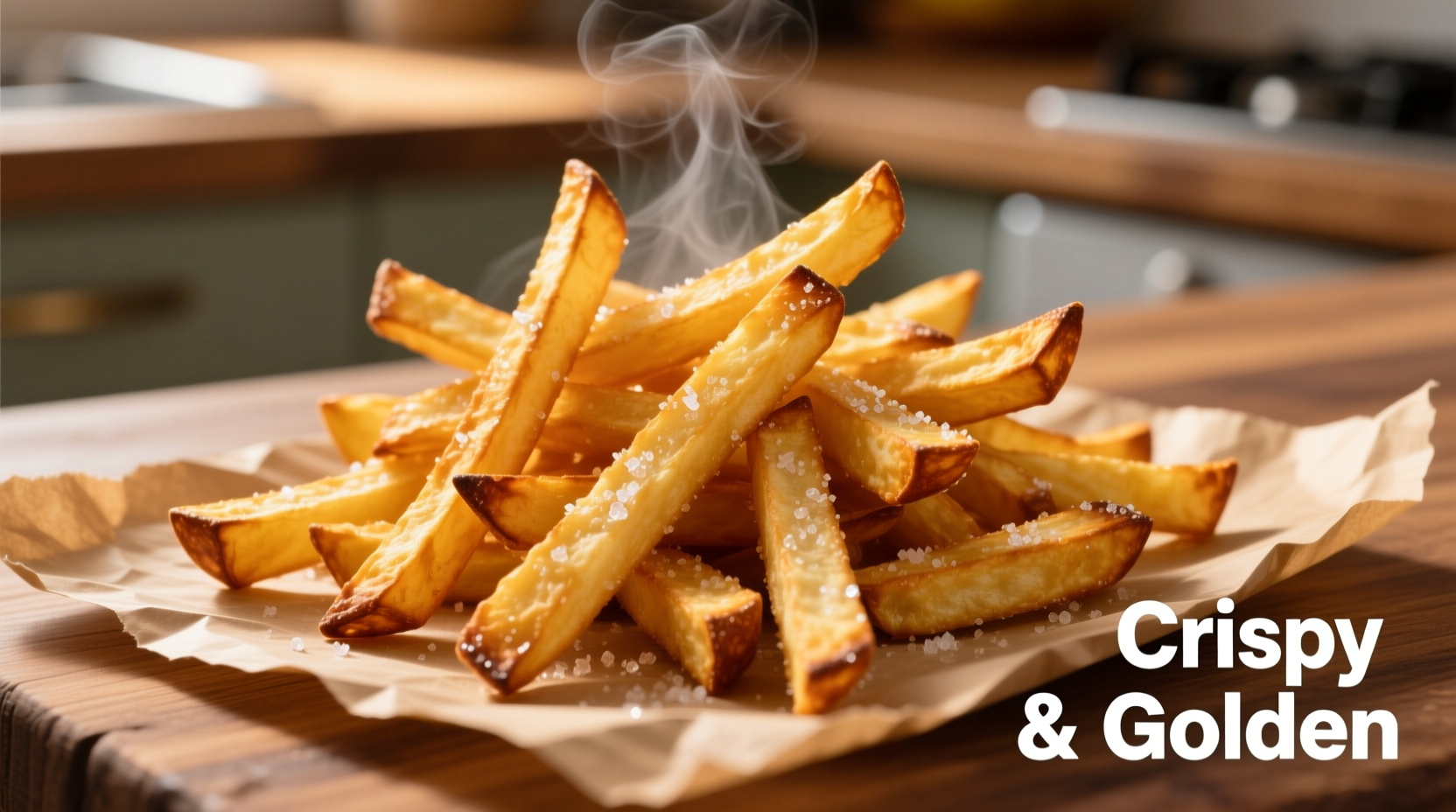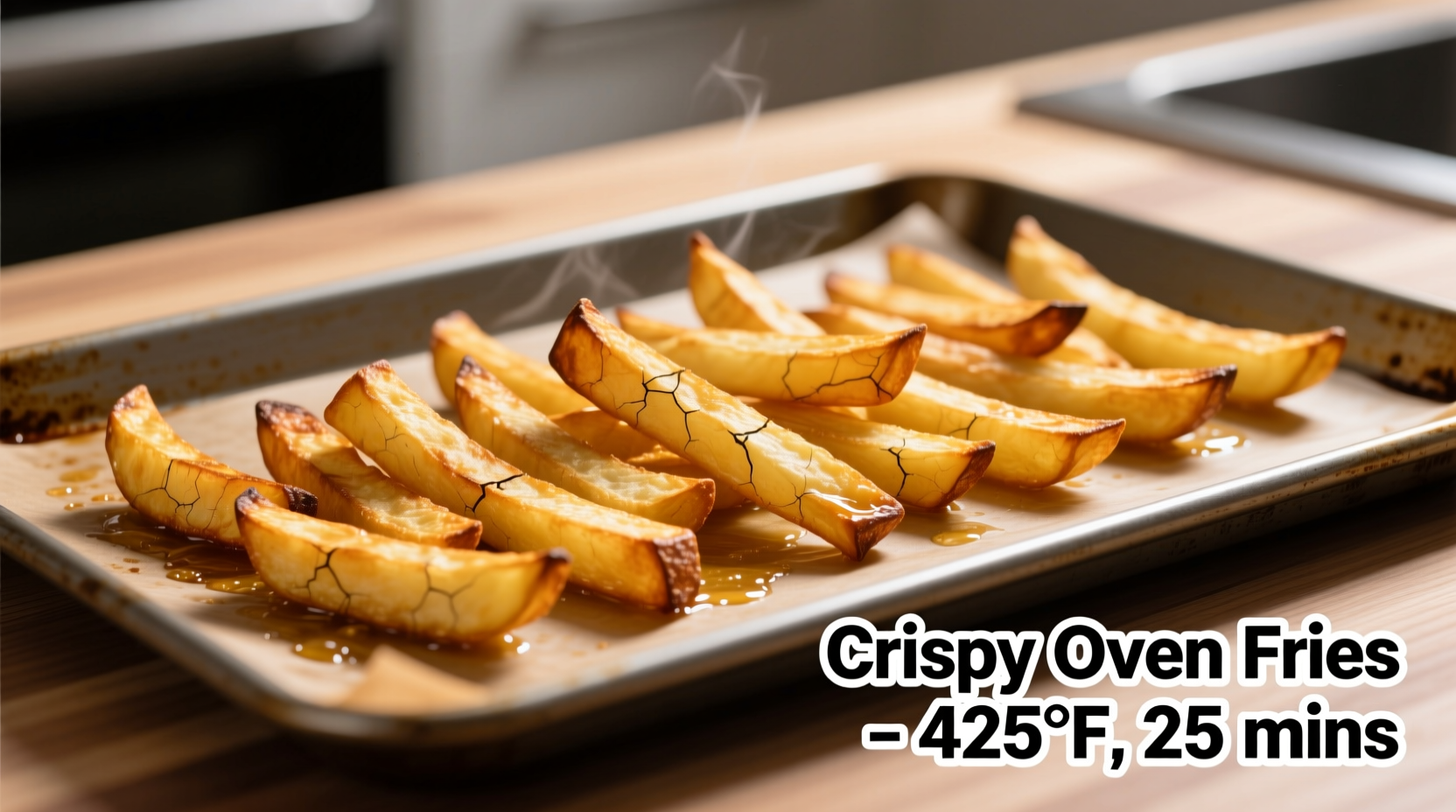Have you ever pulled oven-baked fries from the oven only to find them soggy, limp, or unevenly cooked? You're not alone. Most home cooks struggle with achieving that perfect golden crispness without deep frying. The good news is that with the right technique, you can consistently create restaurant-quality crispy oven fries that satisfy your craving while being significantly healthier than their deep-fried counterparts.
Why Your Oven Fries Keep Failing
Before we dive into the solution, let's address why most oven fry attempts fail. Common mistakes include:
- Using low-starch potatoes like red or new potatoes
- Skipping the soaking step, leaving excess surface starch
- Overcrowding the baking sheet, causing steaming instead of crisping
- Using oils with low smoke points that burn before crisping occurs
- Not preheating the baking sheet for immediate sizzle contact
The Science Behind Crispy Oven Fries
Understanding the food science transforms your results. When potatoes heat above 140°F (60°C), their starch granules absorb water and swell in a process called gelatinization. As temperatures rise further to 300-356°F (150-180°C), the Maillard reaction occurs—creating that desirable golden-brown color and complex flavor.
According to research from the USDA Agricultural Research Service, the key to crispiness lies in managing moisture content. Potatoes contain about 80% water. Removing surface moisture through soaking and thorough drying allows the exterior to dehydrate quickly in the oven, creating that essential crisp texture while maintaining a fluffy interior.
Step-by-Step Guide to Perfect Crispy Oven Fries
Potato Selection Matters Most
Not all potatoes are created equal for oven fries. High-starch varieties like Russet (Idaho) or Yukon Gold deliver superior results compared to waxy potatoes. Here's why:
| Potato Variety | Starch Content | Best For Oven Fries? | Texture Result |
|---|---|---|---|
| Russet (Idaho) | High (20-22%) | ✓ Excellent | Crispy exterior, fluffy interior |
| Yukon Gold | Medium (16-18%) | ✓ Good | Slightly creamy interior, moderately crispy |
| Red Potatoes | Low (14-15%) | ✗ Poor | Dense, often soggy exterior |
| Sweet Potatoes | Medium (15-17%) | △ Variable | Can caramelize but often too moist |
Preparation: The Critical Steps Most People Skip
1. Cutting technique: Cut uniform 1/4-inch thick sticks. Inconsistent sizing leads to uneven cooking—some pieces burn while others remain undercooked.
2. Soaking process: Submerge cut potatoes in cold water for at least 30 minutes (up to 2 hours). This removes excess surface starch that would otherwise create a gummy texture. Change water once during soaking for best results.
3. Drying thoroughly: After soaking, spread potatoes on clean kitchen towels and pat completely dry. Moisture is the enemy of crispiness—any remaining water will steam the fries instead of allowing them to crisp.
The Perfect Seasoning and Oil Combination
Use oils with high smoke points (above 400°F/204°C) like avocado oil, refined coconut oil, or grapeseed oil. Avoid olive oil for high-heat baking as its smoke point is too low (375°F/190°C), causing bitterness.
For every pound of potatoes:
- 1½ tablespoons high-smoke point oil
- ¾ teaspoon fine sea salt (add after baking for best adhesion)
- ¼ teaspoon garlic powder (optional)
- ⅛ teaspoon smoked paprika (optional)
Toss potatoes gently with oil—never salt at this stage, as it draws out moisture. Use your hands to ensure even coating without breaking the fries.
Baking Setup for Maximum Crispiness
1. Preheat properly: Set oven to 425°F (220°C) and place baking sheet inside during preheating. A hot surface creates immediate sizzle contact.
2. Proper arrangement: Remove hot baking sheet and add single layer of fries with space between each piece. Overcrowding causes steaming—use two sheets if necessary.
3. Baking process:
- 20 minutes: Bake undisturbed to allow initial crisping
- Flip carefully using metal spatula
- 15-20 more minutes: Continue baking until golden brown
- Final 5 minutes: Rotate sheet front-to-back for even cooking

Troubleshooting Common Problems
Soggy fries? You likely didn't dry potatoes thoroughly or overcrowded the baking sheet. Try reducing quantity per sheet and ensure complete drying after soaking.
Burnt edges but raw centers? Your oven temperature may be inaccurate. Invest in an oven thermometer—many household ovens run hotter or cooler than displayed.
Uneven browning? Rotate baking sheet front-to-back halfway through cooking and ensure consistent fry thickness.
Storage and Reheating Tips
For best results, enjoy immediately. If you must store leftovers, place in airtight container at room temperature for up to 2 days. To re-crisp:
- Air fryer: 3-4 minutes at 400°F (204°C)
- Oven: 5-7 minutes on baking sheet at 425°F (220°C)
- Skillet: 2-3 minutes per side over medium heat
Avoid microwaving, which creates a rubbery texture by reintroducing moisture.
Professional Chef Secrets for Next-Level Fries
For restaurant-quality results at home:
- Add 1 tablespoon cornstarch to dried potatoes before oiling for extra crispness
- Season with flaky sea salt immediately after baking for perfect adhesion
- For extra flavor, add rosemary sprigs to the baking sheet (remove before serving)
- Try a 50/50 blend of avocado oil and refined coconut oil for subtle flavor complexity











 浙公网安备
33010002000092号
浙公网安备
33010002000092号 浙B2-20120091-4
浙B2-20120091-4